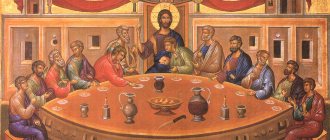Let it be so!
Theological historian Yuri Ruban explains that the Hebrew word, which in Russian means “truly” or “so be it,” is borrowed from the first and oldest part of the Christian Bible. It is equally close to Jews, Muslims and Christians. It is believed that it goes back to the Semitic “amn-”. From Arabic and Hebrew, the root is translated as “perseverance, fidelity, truthfulness.”
If we consider the chronology of the texts of the Bible, the word “amen” first appears in the Third Book of Kings. There it is used as an introduction to the statement and then as a conclusion to the Book of Jeremiah. Traditionally, the “final amin” is included as part of the solemn vows in order to place special emphasis on the last phrase and have the greatest effect on the listeners. In the New Testament, “amen” is used 119 times, half of the time with semantics that have not yet been accurately determined.
What is amen
The word amen is found in all world religions; perhaps this is precisely the key that unites the religions of millions of different people. How and when did it happen? What is its origin?
Origin of the word
It came from Hebrew, and its pronunciation in our language has hardly changed. In ancient times it sounded like "Amen" (with the emphasis on the second syllable). It is interesting that, for example, Catholicism has slightly changed this word - their priests and believers pronounce it, placing the emphasis on the first syllable.
Translated into Russian, the word amen means “so be it” (Jeremiah 11:5).
It was borrowed from Jewish Old Testament texts, passed into the Greek and Latin translations of the New Testament, and then into the Russian language practically unchanged.
In Hebrew it has the same root as the terms meaning:
- "solid";
- "reliable";
- "constant";
- "believe";
- "trust".
History of appearance
This liturgical term first appears in the Old Testament - in the 1st Book of Kings, Benaiah said “Amen” to the anointing of King Solomon at the command of the old and sick David. Vanya called on the will of God for the king’s decision. With one word, he seemed to seal Solomon's reign (1 Kings 1:36), confirming God's approval.
This exclamation, being short, had a greater impact than the last words of the prayer, and was often used in various kinds of oaths. In the divine services of antiquity (VI-IV centuries BC) it was already a response exclamation of believers to the prayer calls of priests. And in the New Testament it is repeated more than 115 times, and in almost half of these cases it is used in a different meaning: at the very beginning of the narrative, without any connection with the previous text.
Name of God
Typically, “amen” is exclaimed at the end of most prayers and sermons, the biblical text, and when reading the Creed. It is considered an unchangeable and integral liturgical formula of worship. Present in the Bible to enhance the truth of God's revelations. In such semantics, the Apostle Paul and Christ himself pronounced “Amen”: “For truly I say to you...”.
“Amen” is pronounced not only at the end of the prayer. It is also used at the beginning of a phrase. For example, “Amen I say to you” - “Truly I say to you.” And in the Apocalypse and the Old Testament Book of Isaiah it is used as the name of Christ. Thus, in John the Theologian we read: “Thus says the Amen, the faithful and true witness.”
All about the meaning of the word “Amen”
The word “amen”, if translated from Greek and Hebrew, will identify our concepts such as fidelity and truth. That is, the word says that everything said above is true and correct. The word "amen" is a term that is used in several cases, having its own symbolic meaning.
By saying “Amen” after completing the prayer, a person confirms that he has completed his appeal to God and finished the prayer. This word is also proclaimed after the reading of the Holy Scriptures, and is also said numerously at the Divine Liturgy, being a kind of liturgical formula.
The word is often found in the Holy Scriptures, where it is a direct confirmation that all Divine truths indicated in the Bible are true and correct. This word is a kind of amplifier of the fidelity of Divine truths. If you carefully read the New Testament, you can trace the fact that it was the word “Amen” that was often proclaimed by the Apostle Paul, and the word was also often used by Christ Himself, confirming that everything He said was reliable and correct.
As for the word “amen” found in the book of Isaiah, it appears here as one of God’s Names, emphasizing not just the faithfulness of everything written in the book, but also the faithfulness of God Himself.
Among the words of the Holy Scriptures that were not translated from the Hebrew language is “amen.” The word entered the Russian language almost unchanged.
Intercession of Angels
In Islam, “Amin” occurs to confirm faith in Allah. Almost always, with a silent exclamation, they express agreement with what they have read or heard from the imam. And as in Christianity and Judaism, with this word Muslims express hope that the Almighty will accept prayers.
The Muslim “Amin” is not sunnah, but, as follows from the teachings of the Messenger of Allah, if after “Bismillah” you say “Amin”, then “there will not be a single angel left in heaven” who would not intercede before Allah for the person praying. According to the advice of the madhhab Abu Hanifa, “ameen” should be pronounced in a barely audible whisper, regardless of whether the sunnah is read silently or out loud. During a collective prayer, it is not forbidden to say “Amin” out loud, but not too loudly so as not to cause inconvenience to other believers.
All three Abrahamic religions have the word "Amen". What does it mean?
Meaning of the word "Amen" in Islam
Similarities between religions
Although the beliefs and religious practices of Islam, Christianity and Judaism are different, there are similarities in the prayer of all three Abrahamic religions. For example, the use of the word “amine”.
In Christianity, this word is pronounced “amen,” and it means the prayer formula “so be it.”
In Islam, the same word is used in the same sense, only it differs in pronunciation - “ameen”.
Where does this word come from and what does it mean?
Amin (also pronounced amen, amen) is a word used in all three Abrahamic religions and means an expression of agreement with God's will. The word is believed to come from an ancient Semitic word consisting of three consonants: A-M-N.
In both Hebrew and Arabic, this word means “truthful,” “firm,” and “faithful.” It can be translated into Russian as “truly so,” “indeed,” “it is so,” or “so be it.”
When a believer says “Amen,” he confirms his faith in the truth of the word of the Almighty, confirms his agreement with His will, and also humbly and hopefully awaits an answer to his prayer.
"Amin" in Islam
Muslims pronounce the word “ameen” after reading Surah al-Fatiha, as well as in their duas.
Saying the word “Amen” after reading Surah al-Fatihah is one of the sunnahs of prayer. The condition for its recitation is that there should not be a long pause after Surah al-Fatiha. Saying the word “Amin” after Fatiha is sunnah both in a group prayer and in the case when a person performs prayer alone.
This practice stems from the words and instructions of the Messenger of Allah (peace be upon him). He taught his companions to say “Amin” at the end of Surah al-Fatiha: “If the “Amin” of a person coincides with the “Amin” of the angels, Allah will forgive his previous sins.” (Bukhari)
In the Hanafi madhhab, in all prayers, “Amin” is pronounced silently.
There is a number of evidence in favor of this opinion, reported by the companions of the Messenger of Allah (peace be upon him) and early scholars.
Wa'il ibn Hujr (may Allah be pleased with him) said that he performed namaz with the Messenger of Allah (peace be upon him), who, having reached the words “Goiril Magdubi alayhim wa lad dollin,” said “Aamiin”, lowering his voice.
Abu Wail reports that Ali, Abdullah ibn Masud and Umar bin Khattab (may Allah be pleased with them) did not say “Bismillah...”, “Auzu billah...” and “Aamiin” out loud in prayer.
When reading dua on their own or in jamaat, Muslims often pronounce “ameen” out loud and there is nothing in this that contradicts the Sunnah. Also, if you say “Amin” in a whisper or to yourself.
Islam-today
Amen and hallelujah
In Old Testament worship, “amen” and “hallelujah” have been present since ancient times. They were exclaimed by the people of Israel listening to the Levitical priests. Christian worship was formed on the basis of synagogue Jewish, therefore an important liturgical term was borrowed by Christians without spelling and semantic changes.
According to Professor M. Skaballanovich, “amen” and “hallelujah” are the only Hebrew words that “the hand of the translator did not dare to touch.” They remained “in the same sounds” in which they were “inspired by God Himself.” It’s just that “hallelujah” is pronounced at the most important moments of the Liturgy, before reading the Gospel, after Communion. And all because the exclamation is translated as “Praise the Lord!”
Scraper
As Yuri Ruban explains, in its broad interpretation, Christianity understands “amen” as a kind of seal of confirmation. It is not for nothing that it is the last word of the Christian Bible and it is no coincidence that it is pronounced not only by the priest, but also by the parishioners. In a single word, they express understanding, agreement and absolute acceptance of what they heard from the clergyman - and this is invariable in all three religions.
“Amen” is also the hope of those praying that all their words will be heard by the Lord. In addition, “Amen” confirms that the format of Christian worship involves dialogue. At the same time, it unites the priest and parishioners into “an organically integral people of God.”
Meaning in religion
The formation of Orthodox worship on the basis of the synagogue Jewish service led to the borrowing of this term as an important liturgical one. Already during the time of Justin (Justin) the Martyr (mid-2nd century), it was pronounced by people after a prayer, which the primate read loudly (First Apology, 65, 67).
In a broad sense, Christianity interprets this word as a verbal seal. It expresses the responsibility of the sons of God before their Creator and gives faith that they will be heard. (In ancient times, the exclamations of those performing the service were answered by the believing people, who at that time participated in the service, and not by the choir, as at present).
In Christianity
At the end of the prayer or exclamation of the clergyman, a cry of all those present is heard. Thus, parishioners make the sign of the cross, join the pastor who is leading the service, and confirm their acceptance and understanding of the essence of the religious texts being spoken. By this they testify to their agreement and (ideally) understanding of the meaning of the words of the prayer they are saying.
In addition, amen expresses the correlation between the ministries of the priest and the people, creating a dialogue during the service, and linking the primate and the “people of God” led by him into one organic whole.
But in Orthodoxy, priests always explain that the main thing is sincere, conscious prayer, and not formal joining to a common spiritual action. So Jesus Christ instructed his disciples: it is important to have pure and good thoughts, which will certainly be rewarded with grace.
This is the most used word in Orthodox worship. In certain parts of the Holy Scriptures it is mentioned in double form, which enhances the significance of the sacred text. It is interesting that the anchor word “amen” is the final word in the narrative of the Christian Bible.
In Islam
In the Muslim world, it is customary to pray by saying it during namaz (daily obligatory prayer), as well as reading the first sura, that is, a chapter of the Koran. Pronouncing it among Muslims after the words “Walad-dallin” is the sunnah of the prophet. In Islam, it is believed that if the person listening also recites it, it will be a virtue for him.
Abu Hurayrah conveys to us the following words of the prophet: “When the imam says: “Walad-dallin,” say Amen. If someone says this and it coincides with the time when the angels pronounce it, then that person will be forgiven all his past sins.”
Islam interprets this concept as follows: Accept our words. Ali Haydar wrote notes in the margins of his holy Qur'an: "The Prophet said Amen and raised the tone of his voice after he said 'Walad-dallin'." Sheikh Zadeh's interpretation says: "Amen" does not belong to the Qur'an. It should be pronounced after the words "Walad-dallin", with a short pause after the letter "Nun" in order to show that it is not part of the text of the Qur'an.
An innovation is the writing of the word Amen in the copy of the Qur'an. This is prohibited.
As Abu Maysara says: “Jabrail listened to the prophet read the Koran, when he reached the words “Walad-dallin”, Jabrail said: “Say Amen!” And the Prophet spoke! One of the companions of the prophet Abu Zuhairi Namiri, seeing a man making dua, said the following: “End your dua with the word “Amen.” After all, it is like a seal placed on a page.”
After that, he added: “Shall I tell you the news regarding this matter? One evening, the Prophet (peace and blessings of Allaah be upon him!) and I went to a man who was making dua very persistently. The Prophet listened to him and then said: “If he puts a seal in his dua, he will thereby commit wajib.” One of the community asked: “What will he use to stamp it?” To which the Prophet (peace and blessings of Allaah be upon him!) replied: “The word ‘Amen’, because with it he will do what is necessary for his prayer to be accepted.”
In conspiracies
If “amen” is used so often in prayers, then why is it also found in conspiracies? It would seem that the church does not approve of the activities of healers and sorcerers. We find an explanation in the monograph “Spell Texts as Monuments of the “Prophetic, Magical Word” by L. Shipanovskaya.
The texts of conspiracies have a dual origin. On the one hand, they are folklore. On the other hand, they retain elements of medieval apocryphal literature. The author includes “Amen”, mention of the Heavenly King and the Most Holy Mother, characteristic prayer addresses (Our Father, Lord God, Lord Jesus Christ), quotes from many canonical prayers (“We thank you our God”, “Glory to the Father and the Son and Holy Spirit") and liturgical rituals (washing, sprinkling).
Conspiracy, like prayer, refers to the manifestations of magical speech functions. The ending of the conspiracy necessarily contains the so-called “fix” - a phrase that consists of a magic formula. The formula of the spell text almost always contains “Amen”, which is repeated three times. The same threefold use of “amen” is found in prayers.
Egyptian Amon
An interesting point of view is expressed by Yuri Ulyanov in his article about “Amen”. He is sure that the roots of “amen” are Egyptian. The word goes back to the name of God Amon, whom the Theban priests worshiped as one of the hypostases of the Sun God Ra. In ancient Greek, “amon” means “hidden, secret.” Amun's sacred animal was the calf. The author is sure that it was the tradition of worshiping the Egyptian Amun that the Jews adopted. This point of view can be considered as one of the versions explaining the preservation of “amen” in “dark” and “pagan” conspiracies.











